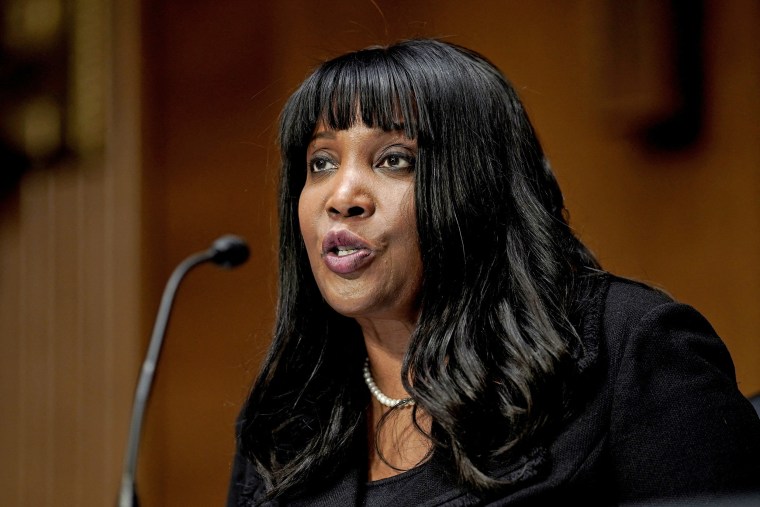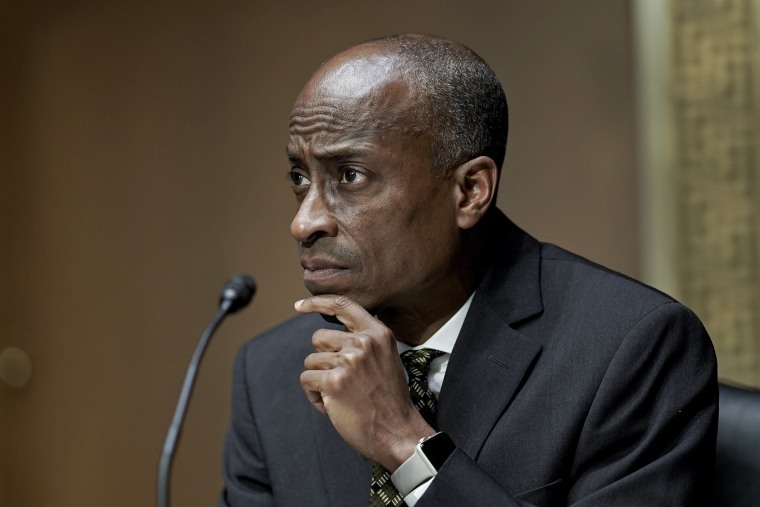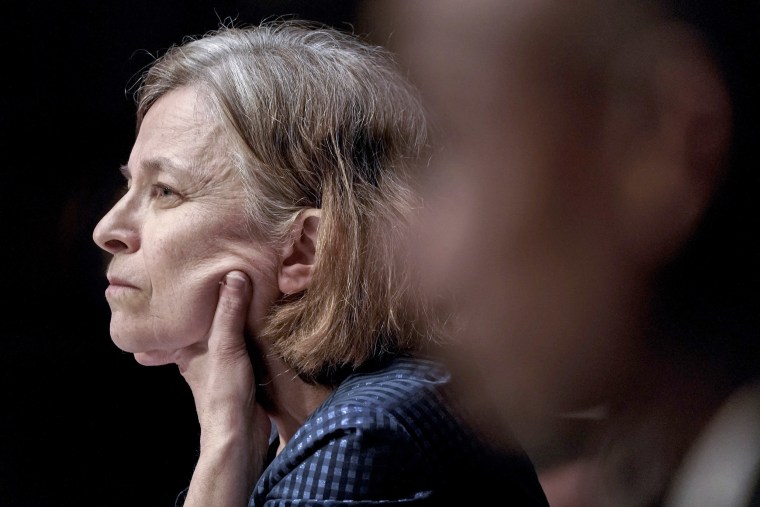Lawmakers sparred with one another and President Joe Biden’s Federal Reserve nominees in a sometimes contentious Senate Banking Committee hearing Thursday morning.
Biden has an unusual chance to nominate three members to the central bank’s policymaking Board of Governors as the result of an unfilled vacancy during Donald Trump's presidency. Biden has said he wants to increase diversity at the Fed, and his trio of nominees includes two women and two Black nominees.
Sarah Bloom Raskin, a former Fed governor and deputy treasury secretary during the Obama administration, is the nominee for vice chair for supervision — the Fed’s highest-profile enforcement position.
The two other nominees are Philip Jefferson, the chief academic officer at Davidson College in North Carolina and a former research economist at the Federal Reserve Board, and Lisa Cook, an economics and international relations professor at Michigan State University. Cook was elected this year to the board of the Federal Reserve Bank of Chicago. If she is confirmed, she would be the first Black woman on the Fed’s Board of Governors.

The main point of contention was Raskin’s progressive leanings with regard to climate change.
"I don’t think she necessarily lost any supporters ... but I’m not sure she actually got any converts, either,” said Brandon Barford, a partner at Beacon Policy Advisors.
The committee's ranking member, Pat Toomey of Pennsylvania, and other Republican senators referred to a May 2020 opinion piece in which Raskin criticized emergency Fed programs implemented in the early months of the coronavirus pandemic to backstop businesses when the economy abruptly shut down. The New York Times column ran with a title and a subhead that read: “Why Is the Fed Spending So Much Money on a Dying Industry? It should not be directing money to further entrench the carbon economy.”
In the column, Raskin said the Fed’s emergency lending programs should have been off-limits to fossil fuel companies, writing, “Even in the short term, fossil fuels are a terrible investment.”
Toomey charged in his opening statement that Raskin seeks to expand the Fed’s dual mandate in a way that would distort financial markets and harm the economy.
“Raskin has said the quiet part out loud,” he said.
Raskin said her viewpoint on the role of banking regulations and climate policy was taken out of context, and she labored to draw a distinction between emergency pandemic capital funding and everyday banking regulation.
Karen Shaw Petrou, the managing partner of the consulting firm Federal Financial Analytics, said, “She is going to need every Democrat.” While Raskin has been confirmed to previous government roles on a bipartisan basis, Petrou said, the stakes are higher this time around.
“In those positions, she was less important, and you didn’t have the third rail of climate change with the kind of constituent and ideological interests that were in evidence today,” she said.
Despite the criticisms, experts said it was unlikely that Raskin’s appointment would be blocked. In such a closely divided chamber, Barford said, Raskin’s testimony could be chalked up as a win. “It’s a good hearing when you maintain your base of support and you don’t close any new doors,” he said.
While Democrats hold a razor-thin margin in the evenly divided Senate, the financial services industry has expressed, if not full-throated, at least solid support for Raskin. Both the American Bankers Association and the Financial Services Forum issued statements in support of her nomination.
“For Raskin, it will be at least slightly bipartisan,” Barford said. “The financial services community, particularly the trade groups and veteran lobbyists — they didn’t mobilize against her.”
While Raskin was the primary focus among committee members on both sides of the aisle, Jefferson and Cook also faced scrutiny. Experts said both are expected to be confirmed on a bipartisan basis, although Cook faced sharper questions.
“I think Philip Jefferson is a shoo-in — he will be confirmed quite easily,” Petrou said.

Cook has been criticized on the right for being outspoken about advocating for progressive politicians and positions on social media. “I think Cook will have some defections, because there’s been some questions about her use of social media to advocate for progressive causes. That’s always controversial,” Barford said.
Some GOP lawmakers also were critical of Cook’s academic background and professional credentials. Committee member Kevin Cramer, R-N.D., said Cook was “fundamentally not qualified” in a Fox Business interview. Sen. Bill Hagerty, R-Tenn., said at the hearing that Cook didn’t have the relevant experience, and he also cast doubt on the veracity of her credentials, citing unspecified mischaracterizations.
Barford dismissed the criticisms, pointing out that Jerome Powell — the current Fed chair, who has been nominated by presidents of both parties — wasn’t an economist by trade.
“The number of people on the board recently who have not been monetary Ph.D. economists has been growing,” he said, saying it was “pretty absurd” to hold Cook to a standard that even the head of the central bank wouldn’t meet.
The Fed has a long history of being consensus-driven, apolitical and deliberate. Even with an influx of new voices — and opinions — that commitment is unlikely to be shaken, experts said.
“I don’t think you’ll see Sarah Bloom Raskin trying to break up the banks or fundamentally restructure them,” Petrou said.
Barford said: “She managed to get the right organizations to either hold their criticism and or endorse her nomination, and I think that’s a key attribute to be able to successfully navigate this sort of process. To still have bank trade groups not vociferously throwing bombs at her nomination is an impressive feat.”
